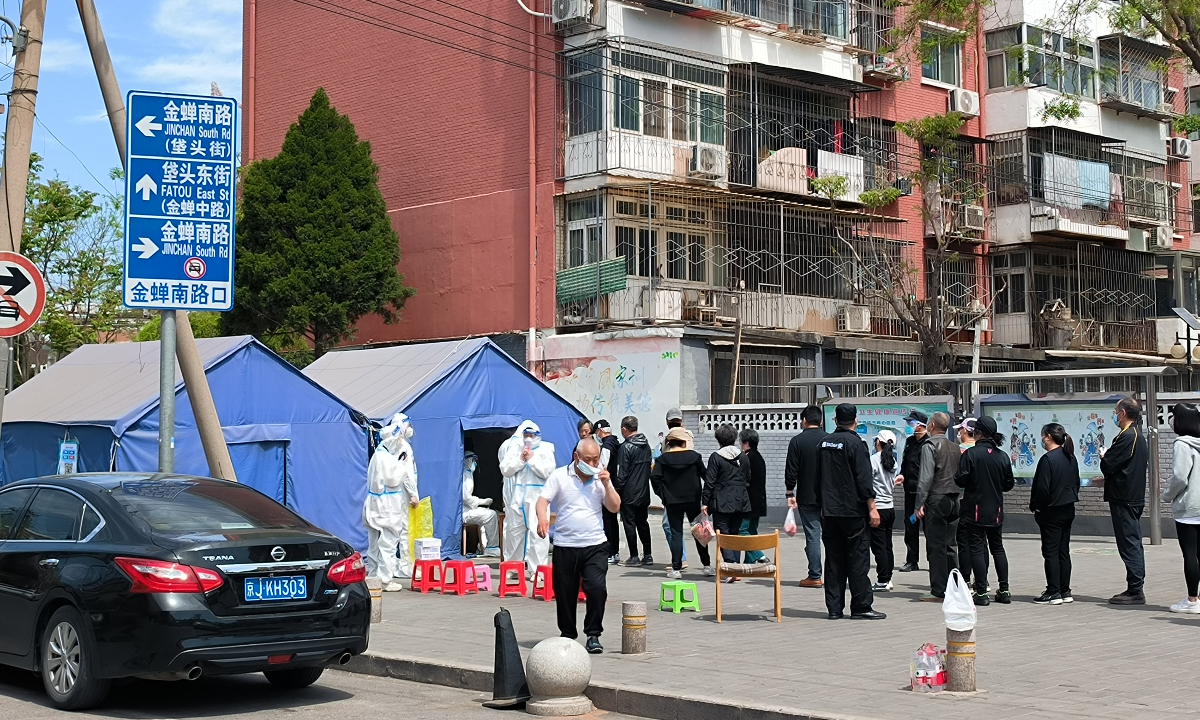
Beijing reports four newly confirmed COVID-19 cases and 10 silent coronavirus carriers on Friday. Photo:VCG
With 15 confirmed COVID-19 cases in Beijing on Saturday, the capital city has taken swift and strict measures, including organizing nucleic acid tests in key groups, and taking partial closed-off management and suspending classes in the areas and a school that spotted the cases.
As transmissions in residential communities continue for a week, Beijing authorities warned of a high risk of continuous infections. The key for Beijing to put this flare-up under control is to figure out the transmission routes and quickly cut them in communities, experts said, noting that it is less possible to see Shanghai's situation reappear in Beijing with swift and comprehensive measures.
Among the 15 new cases on Saturday, 12 are in Chaoyang district, nine of whom are students from a middle school, two in Shunyi district and one in Fangshan district. Pang Xinghuo, deputy director of the Beijing municipal disease prevention and control center, said that since April 22, 20 confirmed cases have been found in Beijing.
The middle school that reported confirmed cases on Saturday has suspended classes with faculty and students required to stay indoors to have nucleic acid tests. Close contacts of the cases are under medical observation.
Schools in Chaoyang district are required to take three sweeping nucleic acid tests within a week. Another school in Fangshan district where the children of a confirmed case studied has been under closed-off management and all the students and teachers have received nucleic acid tests. The district also ordered the cancelation of offline training classes or group activities of students.
Given the one-week-long transmission period, unknown origins of some confirmed cases and people's activities in the past period, the risk of wider infections is still high. But the epidemic situation may not become as severe as Shanghai, Wang Yuedan, a professor of the Department of Immunology at Peking University, told the Global Times.
Wang said that Beijing has always taken more stable prevention measures, especially in conducting large scale nucleic acid tests and managing population flow. But unlike winter, which helped virus spread, the weather in Beijing in recent days is warm. The key to extinguishing this round of flare-up is to figure out the transmission route and cut the infections in communities.
However, Wang also noted the upcoming May Day holidays may pose a big challenge in preventing the virus as many people have made travel plans, which may increase the transmission risk. The expert also suggested making Chaoyang district, where most of the cases have been reported, as a controlled area for prevention.
As confirmed cases were spotted in a senior tour group, Beijing also strengthened their screening.
Yang Beibei, deputy head of Chaoyang district, told the Saturday press conference that individual construction programs have been suspended in Chaoyang and sweeping nucleic acid tests are being conducted on all workers in construction projects and decoration teams in the district.
The Global Times learned that on Saturday, many residential communities near where the confirmed cases lived and worked conducted nucleic acid tests.
Tian Wei, director of the Beijing government publicity department, said the prevention situation in the city is urgent and severe and the city needs to take swift actions to curb transmission within the shortest period.
Cai Qi, Beijing's Party chief, hosted a meeting on Friday, where he said the capital city is in a serious condition given the complicated transmission chains, and he urged the stamping out of the virus as soon as possible. Task forces from the municipal government were dispatched to Shunyi and Chaoyang districts to oversee their COVID-19 prevention and control work.




